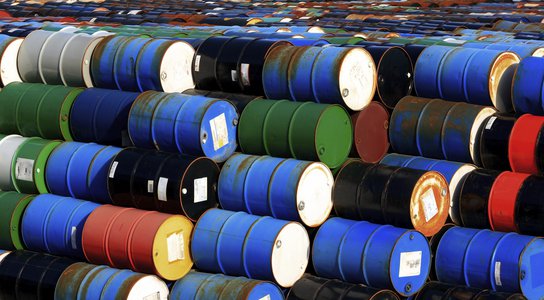Two huge European oil companies and a former International Monetary Fund (IMF) official have had business ties to a middleman at the centre of a Portuguese corruption probe, our new investigation reveals.
José Veiga, reportedly a fixer for the president of Republic of Congo and the target of a corruption probe, formerly had a stake in an oil company that has links to both French oil giant Total and Italian national oil company Eni. His partner in that company was the former IMF representative in Congo, Yaya Moussa.
The IMF provided Congo with almost $2 billion in debt relief in 2010. Moussa, the resident representative who helped to negotiate the bailout, left his post shortly before the bailout was granted and set up a Delaware-based oil company called Kontinent in the same year. Moussa has since won shares of licences in Congo’s oil-rich offshore fields, held by his company Kontinent Congo, which he co-owned with Veiga. As recently as 2015, Veiga owned 49 percent of Kontinent Congo.
The news comes as the IMF is considering a second bailout in eight years for Congo, whose public purse has been drained by a toxic combination of falling oil prices and a ruling presidential family suspected of corruption, money laundering and embezzlement.
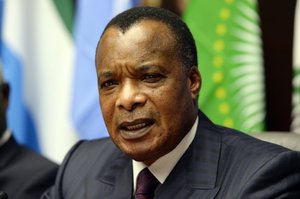
Denis Sassou Nguesso, President of Republic of Congo since 1997 (and previously President from 1979 to 1992). Credit: THIERRY CHARLIER/AFP/Getty Images
The “Portuguese wizard” of the Congolese president
Veiga, a former director of Benfica football club and reportedly known as Congolese President Denis Sassou Nguesso’s “Portuguese wizard”, was arrested in early 2016 as part of a Portuguese investigation into money laundering, tax fraud, influence peddling and international corruption in Congo.
Veiga allegedly received large payments from companies looking to invest in Congo, which he subsequently shared with members of the Congolese authorities through a complex and opaque offshore structure, according to investigators. Veiga spent three months in jail and two months under house arrest, but has now been released. The investigation is ongoing.
Total and Eni in business with controversial middleman
Both Total and Eni held oil licences in which Kontinent Congo was granted a share as part of a renewal process in mid-2015. These licenses required ratification by the Congolese parliament after the renewal and the addition of Kontinent Congo as a partner.
However, both companies dropped the licences in question at the end of 2016, before parliamentary approval and 10 months after Veiga’s arrest. Total and Eni’s apparent willingness to do business with Veiga casts considerable doubt upon the quality of their due diligence processes and risk mitigation strategies. They should already have known of the negative press reports about him: since 2014 the Portuguese media had reported Veiga’s suspicious connections to the Congolese presidential family.
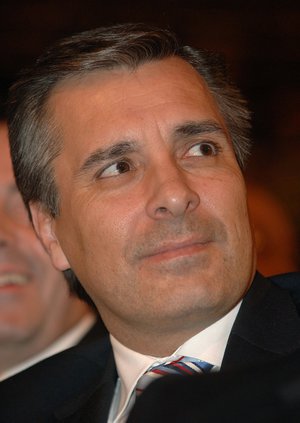
José Veiga, a Portuguese businessman reportedly linked to the Congolese presidential family, is the target of a Portuguese investigation into corrupt deals in Congo. Credit: CityFiles/Getty Images
Total admitted to Global Witness that it had identified both Veiga and Moussa, owners of Kontinent Congo, as raising potential compliance issues. The company said that in order to address these it had planned to put in place “provisions intended to mitigate the risk that any persons affiliated with public officials would be in a position to improperly influence operations under the JOA [joint operating agreement]”. Total was therefore aware of the possible risks of partnering with Veiga and Moussa, but decided it would still be acceptable to go into business with them.
Total also noted that it was operating under the terms of a Deferred Prosecution Agreement with the US Department of Justice (DoJ) during this period. The company said that the DoJ “expressed concerns about the proposed participation of certain local partners”. Although Total did not name any company, Global Witness believes these concerns would likely include Kontinent Congo and its owners at the time.
Lawyers representing Kontinent Congo and Moussa told Global Witness that these claims were “completely without foundation”, adding: “To their knowledge, our clients have never been the subject of any corruption investigation in any jurisdiction, or been flagged as a concern by any law enforcement agency in the world.”
“Clearly it’s not just Global Witness that is worried about risks around Veiga and Moussa – their proposed business partner, Total, also identified issues with both men,” said Mariana Abreu, Campaigner at Global Witness. “That the DoJ also raised concerns shows just how much of a red flag Kontinent Congo was, but Total and Eni both seemed willing to do a deal with the company in 2015. The management of these oil majors should face scrutiny over their decision making on these licences.”
Total and Eni may have dropped one set of licences with Kontinent, but Eni still owns a field, known as Loango II, in which Kontinent holds 5 percent of the shares. Eni is facing trial in one of the biggest corruption cases in history for a separate oil deal in Nigeria and its offices were raided in April this year as part of a probe into its business in Congo. In contrast to Total, Eni said at its 2017 AGM that it had carried out due diligence on its partners and found no concerns regarding Moussa or Veiga, adding that suggestions that they acted as representatives of the Congolese presidential family were “groundless”.
“This is just the latest example of the massive risks Eni has taken in its business deals,” said Abreu. “The company is already having to defend its work in Nigeria, and now serious questions are being raised about its Congo activities. We’re beginning to see a pattern emerging of Eni partnering with politically-connected individuals who are later investigated for facilitating corruption. It’s high time Eni’s management is held accountable for the problematic deals they have struck and the risks they seem to have ignored in the process,” she added.
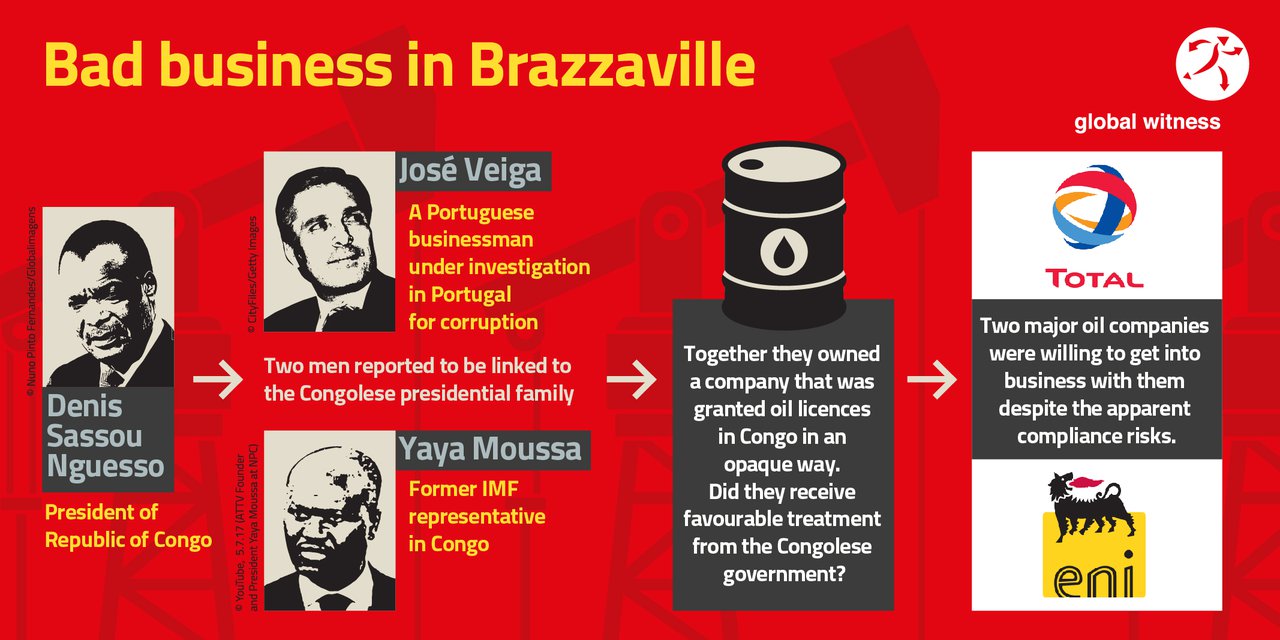
Role of former IMF negotiator
Yaya Moussa, founder and owner of Kontinent, also faces difficult questions about his business relationship with Veiga. Not only are the men linked via Kontinent Congo; they were both on the Board of Directors of Benin-based Banque Africaine pour l’Industrie et Commerce (BAIC) bank, where Moussa also held shares as part of his compensation package for the role. Media reports suggest that Veiga acted as a representative of the Congolese presidential family in the bank. Moussa told Global Witness he left his position at BAIC in 2017.
As IMF resident representative in Congo’s capital Brazzaville, Moussa played an important role in the team which oversaw the IMF’s bailout for Congo in 2010. When commenting on his IMF appointment, he recognised it was a tough job “but… I needed to go there and try to help”.
The $1.9 billion of debt relief came with several strings attached, not least the demand on the Congolese government to abide by transparency and good governance provisions. “This is a very tangible achievement”, Moussa said. Despite that, Congo’s oil sector has continued to be beset by scandals, hidden debts and gross mismanagement, and the government is asking for a bailout once again.
In summer 2009, just before the last bailout was granted in January 2010, Moussa left his post at the IMF because he wanted “to accomplish even more for Africa”. He set up Kontinent in Delaware only three months after the bailout was confirmed, although he did not obtain Congo oil licences until 2015.
During his time as the IMF representative in Brazzaville, Moussa enjoyed cordial relations with the Congolese government, as reported by The Times. According to the Swiss NGO Public Eye, Moussa likely came to know the Congolese President’s son, Denis Christel Sassou Nguesso, during this time, although Moussa claims, through his lawyers, that the men did not meet until 2011. The acquaintance was clearly in place by that point, with Moussa ‘facilitating’ a promotional tour for Sassou Nguesso’s charitable foundation, Perspectives d’Avenir, in the United States in 2011.
In a letter to Global Witness via his lawyers, Moussa confirmed his attendance of at least one event during the tour, but clarified he was not paid to attend nor did he pay anyone else to organise or attend it. He also denied that there has ever been any conflict of interest in his role at the IMF.
In contrast to Moussa’s claims about his achievements as the IMF representative and the available evidence of his central role as part of the IMF team overseeing the bailout process, Moussa’s lawyers said that “suggesting that Dr Moussa, as a single IMF representative, did or was able to facilitate a country’s access to debt relief is fanciful”, highlighting that a large team was involved in the bailout decision.
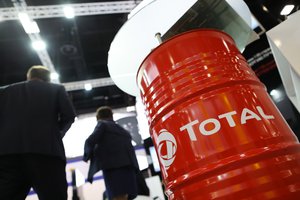
Credit: Andrey Rudakov/Bloomberg via Getty Images
Opaque oil licensing process
Global Witness could not find any publicly available information on how Kontinent Congo received its shares in oil licences, which is at odds with IMF recommendations on transparency in the natural resources sector provided in the run up to bailout. Part of the IMF team that took part in producing these recommendations, ironically, was Yaya Moussa.
According to press reports and Total’s written response to questions, Kontinent Congo received a participating interest in these oil licences on the grounds of ‘local content rules’ (Art. 143 of the Congolese Hydrocarbons Code). These rules mean that international oil companies are expected to partner with local companies on major oil developments. The aim of this provision is to develop local capacity and skills and to use local goods and services to benefit the Congolese economy.
Kontinent LLC was incorporated in Delaware while Yaya Moussa hails from Cameroon and José Veiga from Portugal. The company holding the licence is Kontinent Congo, a Congolese company, but still does not qualify as a ‘private national company’ as defined by Congolese law; according to the oil code, a local partner must be registered in Congo and be more than 50 percent owned by a Congolese national. It appears, then, that Kontinent does not meet either the letter or the spirit of this provision of the law, which was intended to promote local development.
In response to Global Witness, Moussa’s lawyers said that the local content laws were not in place when Kontinent was first granted oil licences. It is true that the draft bill had not at that stage been rubber stamped, but Kontinent had been nominated as a local partner by the Congolese government “in line with this new policy”, according to Total. Moussa’s lawyers added that Kontinent would qualify under the local content rule because Veiga was granted Congolese citizenship. Even if true, this would not have met the standard in the law because Veiga owned less than half of the company at the time.
“Kontinent Congo does not seem to be the kind of company that the local content rules are designed to promote. This raises serious questions as to the extent to which the granting of oil licences to Kontinent Congo constitutes preferential treatment for the company, Veiga and Moussa, rather than a genuine attempt to promote local business interests,” said Abreu.
In response to questions from Global Witness, Eni disclosed Veiga and Moussa as the sole shareholders of Kontinent Congo as of 2015. Eni said that it was not appropriate to respond further to questions because “an investigation is being carried out by the Milan Public Prosecutor in respect of certain activities of the company in Congo.”
Global Witness sought comment from José Veiga via his lawyer, but did not receive a response.
What’s next?
It is unclear whether the IMF will grant Congo further debt relief. But the case of Veiga, Moussa, Total and Eni emphasizes how important it is that the IMF imposes strict criteria related to transparency measures as part of any bailout package.
Companies investing in Congo, and across the world, must observe best due diligence and governance practices. It is also crucial that Congo’s government enforces the highest standards in the management of resources and public revenues if the country is to avoid finding itself needing another bailout in the future.
On 27 December 2018 Total issued a response to this article, available here.
This article was amended on 27 March 2019 to include a response from lawyers for Kontinent Congo and Dr Yaya Moussa refuting any suggestion that their clients had been the subject of any corruption investigations or been flagged as a concern by any law enforcement agencies.
Credit for Banner Image: Veronique DURRUTY/Gamma-Rapho via Getty Images
Find out more
You might also like
-
Briefing IMF must ensure kleptocratic regime in the Republic of Congo does not get another sweet deal
Despite its huge oil reserves, for the second time in less than a decade, the Republic of Congo is on the verge of bankruptcy. Find out why.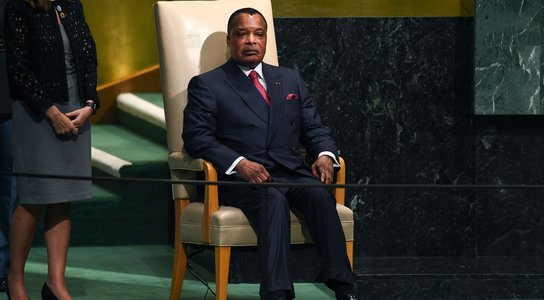
-
Press release Eni past or current staff under investigation in Republic of Congo corruption probe rises to four out of five
Italian oil giant Eni today confirmed that Maria Paduano, a founding director of opaque company World Natural Resources, is a current Eni employee. This brings the count of current or past Eni staff under an Italian investigation in a Republic of Congo (Congo Brazzaville) corruption probe to four out of five.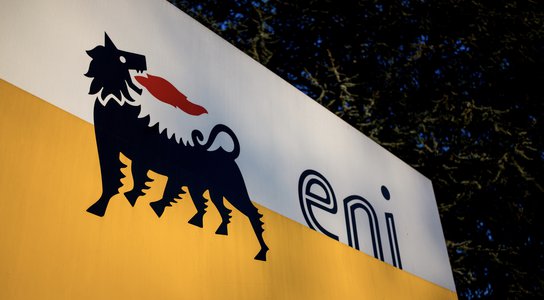
-
Blog post Hey, Big Lenders
The arrival – or increased presence – of commodity traders on the lending scene is concerning, and could be a key factor in Africa’s current debt problems.